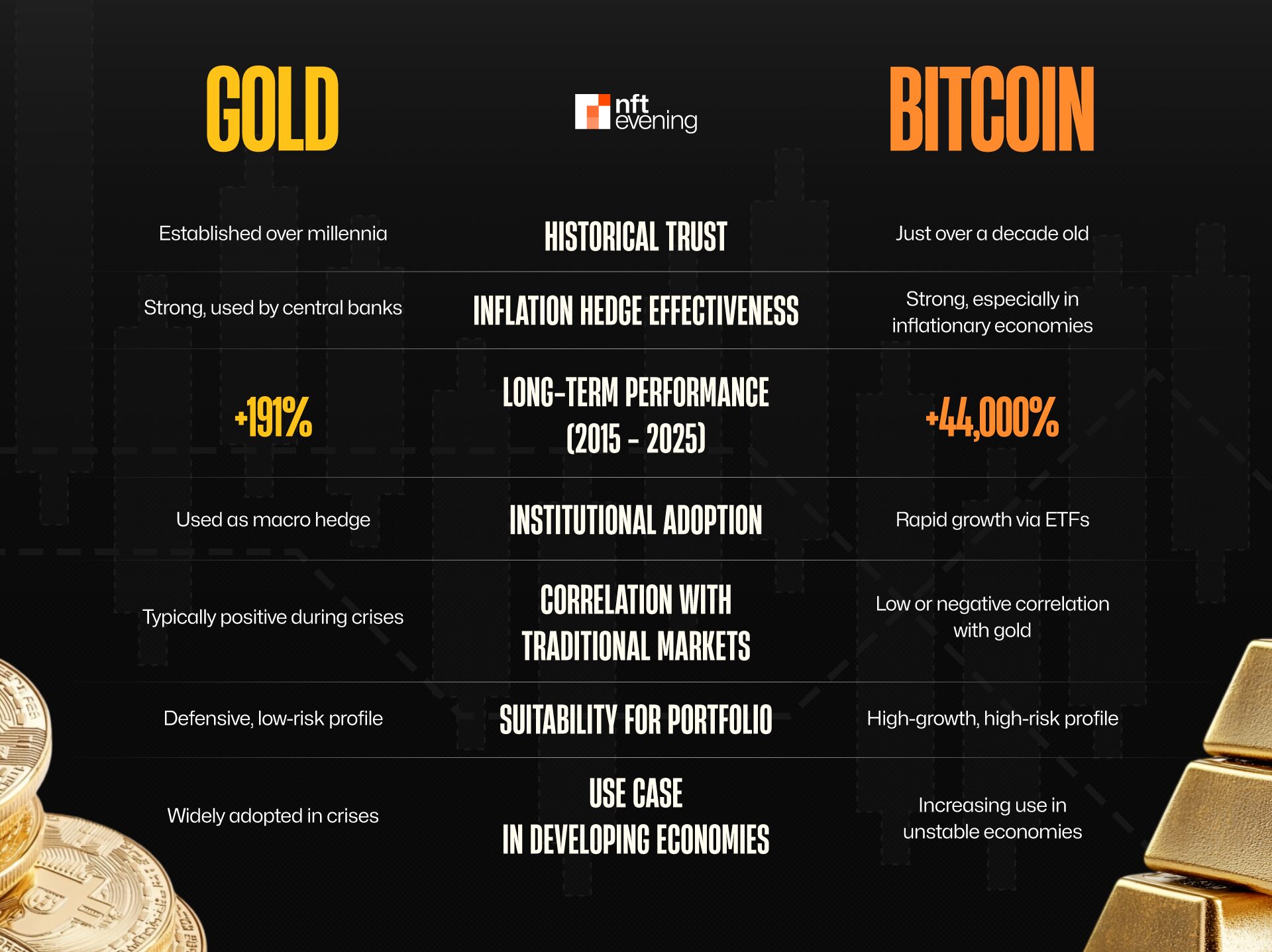Amid persistent inflation, a weakening U.S. greenback, escalating commerce wars, and waning belief in fiat currencies, the 2 property most ceaselessly mentioned by buyers at present are gold and Bitcoin.
From fears of devaluation to the need to protect buying energy, the race to turn out to be the “protected deposit field” of the twenty first century has by no means been extra intense.
Gold and Bitcoin Surge Amid Financial Uncertainty
Spot gold costs surpassed $3,500 per ounce on April 22, marking a brand new all-time excessive. JPMorgan forecasts the common gold worth in 2025 to achieve $3,675/oz, probably climbing to $4,000/oz if excessive rates of interest persist over an prolonged interval.
Knowledge exhibits that China now holds over 2,292 tonnes of gold, accounting for six.5% of its complete overseas alternate reserves. The Folks’s Financial institution of China has been steadily accumulating gold for a number of consecutive months, fueling international demand and accelerating the development towards de-dollarization.

Supply: UK Investing
Bitcoin has additionally made important strides. As of April 23, BTC is buying and selling round $93,500, up greater than 20% year-to-date. BlackRock’s spot ETF (IBIT) has attracted over $39.7 billion, turning into a key driver in Bitcoin’s institutional adoption. Funding giants akin to Constancy, ARK Make investments, and VanEck are additionally growing their BTC allocations in long-term portfolios.
When Money Is No Longer Engaging
On a coverage stage, Bitcoin’s function has been elevated following U.S. President Donald Trump’s government order to ascertain a “Strategic Bitcoin Reserve” beneath the Division of the Treasury. This transfer not solely carries symbolic significance but additionally formalizes Bitcoin as a part of the nation’s reserve property. In the meantime, gold continues to function a standard pillar in central financial institution reserves worldwide.
In keeping with information printed by CoinShares on April 22, each gold and Bitcoin act as efficient hedges towards declining buying energy in inflationary environments. Buying energy, the flexibility of a unit of forex to purchase items and companies has been persistently eroded amid rising inflation.
The Client Value Index (CPI) stays a standard device to measure this decline, and in such a panorama, gold and Bitcoin stand out as two of the few property able to preserving actual worth.
The report cites examples akin to the UK, the place the worth of an 800-gram loaf of white bread has elevated steadily since 1971, reflecting important depreciation of the British pound. In Lebanon, the place inflation peaked at 268% in April 2023, residents had been pressured to desert their native forex in favor of gold and Bitcoin to protect buying energy.
These are clear indicators that fiat currencies can fail of their function as a retailer of worth, prompting a shift towards “exhausting property.” Bitcoin has emerged because the digital successor to gold, notably favored by youthful generations and communities excluded from the normal banking system.


Bread Value – Supply: UK Investing
In sensible phrases, Bitcoin affords superior flexibility in storage and switch. In contrast to gold, Bitcoin shops in chilly wallets and strikes globally in minutes with low value. A quickly evolving safety infrastructure, that includes multi-signature wallets, offline storage, and digital asset insurance coverage can also be strengthening its attraction.
Gold and Bitcoin: Which one is best?
Volatility – as soon as seen as Bitcoin’s largest disadvantage, is exhibiting indicators of stabilization. In keeping with information from CoinMetrics and Bloomberg, Bitcoin’s 30-day volatility presently sits at 46%, its lowest stage in two years. In distinction, the Gold Volatility Index (GVZ) is climbing to its highest level because the pandemic, signaling a resurgence in short-term hypothesis.
Lengthy-term traits supply a compelling view: when it comes to buying energy progress since 2011, Bitcoin has considerably outperformed gold. Nonetheless, as a consequence of its larger volatility, Bitcoin is best fitted to long-term buyers with a excessive danger urge for food, whereas gold stays the defensive asset of alternative.
Research present Bitcoin and gold keep weakly or negatively correlated, particularly in market stress. Newhedge information exhibits the Bitcoin and gold correlation not often stays above 0.5, usually turning damaging.
Notably, throughout main Bitcoin drawdowns (2018, 2022) or sharp rallies (2021), its correlation with gold tends to say no. This proof exhibits gold reacts to danger, whereas Bitcoin responds to progress and liquidity shifts.


Bitcoin and Gold correlation – Supply: Newhedge
In consequence, combining each property in a portfolio can enhance risk-adjusted returns by diversification. Buyers more and more view Bitcoin and gold as complementary property in trendy allocation methods.
Main institutional gamers now favor twin publicity: gold for macroeconomic stability and Bitcoin for uneven progress potential. ARK Make investments holds gold as a hedge and raised Bitcoin publicity to 12% in 2024.
SkyBridge Capital allocates 85% to gold and bonds and 15% to Bitcoin and tech shares. This balanced technique has confirmed efficient amid more and more risky market cycles.


Conclusion
Whereas gold affords consistency and belief constructed over millennia, Bitcoin offers adaptability and scalability for a digital future. Historic efficiency, institutional momentum, and evolving financial insurance policies recommend that the optimum technique for buyers is to not decide sides however to diversify intelligently. Allocating a portion of 1’s portfolio to each property, balancing gold’s defensive energy with Bitcoin’s progress trajectory, could supply one of the best likelihood at preserving and increasing wealth within the twenty first century.
Learn extra: Day Buying and selling Crypto: A Newbie’s Information





















